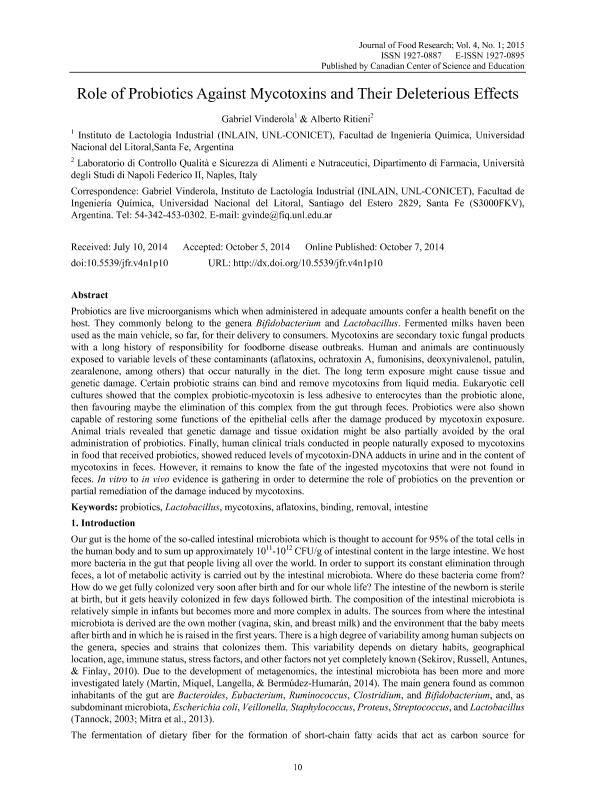Mostrar el registro sencillo del ítem
dc.contributor.author
Vinderola, Celso Gabriel

dc.contributor.author
Ritieni, Alberto
dc.date.available
2018-09-12T17:33:32Z
dc.date.issued
2014-10
dc.identifier.citation
Vinderola, Celso Gabriel; Ritieni, Alberto; Role of Probiotics Against Mycotoxins and Their Deleterious Effects; Wiley VCH Verlag; Journal of Food Research; 4; 10-2014; 10-21
dc.identifier.issn
1927-0887
dc.identifier.uri
http://hdl.handle.net/11336/59334
dc.description.abstract
Probiotics are live microorganisms which when administered in adequate amounts confer a health benefit on the host. They commonly belong to the genera Bifidobacterium and Lactobacillus. Fermented milks haven been used as the main vehicle, so far, for their delivery to consumers. Mycotoxins are secondary toxic fungal products with a long history of responsibility for foodborne disease outbreaks. Human and animals are continuously exposed to variable levels of these contaminants (aflatoxins, ochratoxin A, fumonisins, deoxynivalenol, patulin, zearalenone, among others) that occur naturally in the diet. The long term exposure might cause tissue and genetic damage. Certain probiotic strains can bind and remove mycotoxins from liquid media. Eukaryotic cell cultures showed that the complex probiotic-mycotoxin is less adhesive to enterocytes than the probiotic alone, then favouring maybe the elimination of this complex from the gut through feces. Probiotics were also shown capable of restoring some functions of the epithelial cells after the damage produced by mycotoxin exposure. Animal trials revealed that genetic damage and tissue oxidation might be also partially avoided by the oral administration of probiotics. Finally, human clinical trials conducted in people naturally exposed to mycotoxins in food that received probiotics, showed reduced levels of mycotoxin-DNA adducts in urine and in the content of mycotoxins in feces. However, it remains to know the fate of the ingested mycotoxins that were not found in feces. In vitro to in vivo evidence is gathering in order to determine the role of probiotics on the prevention or partial remediation of the damage induced by mycotoxins.
dc.format
application/pdf
dc.language.iso
eng
dc.publisher
Wiley VCH Verlag

dc.rights
info:eu-repo/semantics/openAccess
dc.rights.uri
https://creativecommons.org/licenses/by-nc-sa/2.5/ar/
dc.subject
Mycotoxin
dc.subject
Food
dc.subject
Probiotics
dc.subject
Removal
dc.subject.classification
Alimentos y Bebidas

dc.subject.classification
Otras Ingenierías y Tecnologías

dc.subject.classification
INGENIERÍAS Y TECNOLOGÍAS

dc.title
Role of Probiotics Against Mycotoxins and Their Deleterious Effects
dc.type
info:eu-repo/semantics/article
dc.type
info:ar-repo/semantics/artículo
dc.type
info:eu-repo/semantics/publishedVersion
dc.date.updated
2018-09-11T18:01:31Z
dc.journal.volume
4
dc.journal.pagination
10-21
dc.journal.pais
Canadá

dc.journal.ciudad
Toronto
dc.description.fil
Fil: Vinderola, Celso Gabriel. Consejo Nacional de Investigaciones Científicas y Técnicas. Centro Científico Tecnológico Conicet - Santa Fe. Instituto de Lactología Industrial. Universidad Nacional del Litoral. Facultad de Ingeniería Química. Instituto de Lactología Industrial; Argentina
dc.description.fil
Fil: Ritieni, Alberto. Università degli Studi di Napoli Federico II; Italia
dc.journal.title
Journal of Food Research
dc.relation.alternativeid
info:eu-repo/semantics/altIdentifier/doi/http://dx.doi.org/10.5539/jfr.v4n1p10
Archivos asociados
